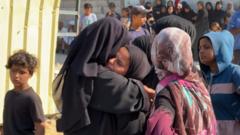As reports detail dire humanitarian conditions in Gaza, Israel has unveiled new measures aimed at improving aid delivery. Despite these efforts, agencies and advocates express concern over the adequacy and sincerity of such actions, emphasizing a need for broader interventions to resolve the ongoing crisis.
Israel Announces Humanitarian Aid Measures Amid Global Outcry Over Gaza Crisis

Israel Announces Humanitarian Aid Measures Amid Global Outcry Over Gaza Crisis
In response to escalating international criticism, Israel takes steps to facilitate aid in Gaza, but skepticism remains over their effectiveness and motivations.
Israel is facing mounting criticism from the international community regarding its role in the humanitarian crisis unfolding in Gaza, where food shortages have left many residents on the brink of starvation. In a notable attempt to alleviate this situation, the Israel Defence Forces (IDF) announced a series of measures purported to enhance the humanitarian response in the region. Key among these actions is a planned airdrop of aid, which the IDF executed first during the night, subsequently allowing the United Arab Emirates air force to participate with additional deliveries.
Moreover, the IDF declared a “tactical pause” in their military operations in specific areas, alongside the establishment of designated humanitarian corridors to counter allegations of systematic starvation. However, Hamas swiftly dismissed these gestures as a mere “deception,” alleging that Israel was attempting to sanitize its global image without addressing the underlying issues leading to the crisis.
On a grim note, despite the announced pause, reports emerged of subsequent airstrikes in Gaza, resulting in the tragic loss of civilian lives, including that of a mother and her four children. Israel maintains its stance that it is not culpable for the humanitarian disaster and emphasizes no restrictions on the flow of aid. Nonetheless, this viewpoint is not widely accepted by allied nations or humanitarian organizations actively working in Gaza.
The recent measures could suggest a recognition of the pressure Israel faces from allies who are beginning to openly condemn its actions. Notably, a joint statement from the United Kingdom, France, and Germany underscored their demand for Israel to lift restrictions on aid and allow humanitarian entities to operate freely to mitigate starvation.
Israel’s stringent control over aid entering Gaza was highlighted previously when it implemented a complete blockade, limiting approval for aid convoy contents and movements. A new system, dubbed the ‘Gaza Humanitarian Foundation’ (GHF), has been set up, further complicating the operational framework for aid distribution. According to Israeli officials, this move aims to prevent Hamas from diverting aid meant for civilians. However, the United Nations and numerous agencies have expressed strong reservations about this initiative, which they view as militarized and inhumane.
Former humanitarian workers have recounted incidents where civilians were shot during attempts to access aid, fueling further criticisms of IDF operations. Jonathan Whittall, head of the UN’s Office for the Coordination of Humanitarian Affairs in the Occupied Palestinian Territories, remarked on the severe deterioration of conditions in Gaza, labeling current measures as insufficient without increased facilitation and safety assurances.
Meanwhile, Prime Minister Benjamin Netanyahu and his former defense minister, Yoav Gallant, face allegations of war crimes relating to starvation tactics, with an arrest warrant issued by the International Criminal Court. They firmly reject these accusations.
Israel’s recent aid drops, although visually impactful, have drawn skepticism regarding their long-term effectiveness in addressing the humanitarian needs in Gaza. Humanitarian experts argue that dropping aid from aircraft should be a last resort, primarily used when ground access is impossible. With existing infrastructure in closer proximity to Gaza ready for support, critics argue that air drops do little to genuinely resolve the crisis.
As the situation persists, calls for a comprehensive ceasefire and unrestricted access for humanitarian aid proliferate, highlighting the urgent need for a lasting resolution. With a staggering proportion of Gaza’s population currently facing food shortages, the international community's attention remains intensely focused on ensuring that effective measures are enacted to alleviate the plight of those affected.



















